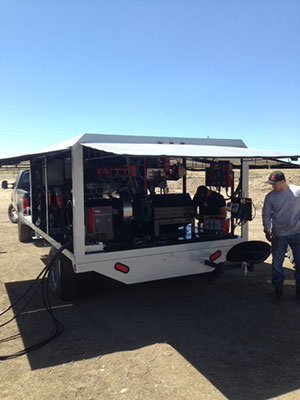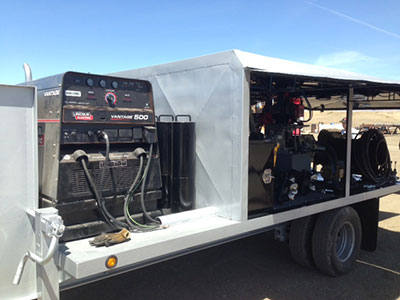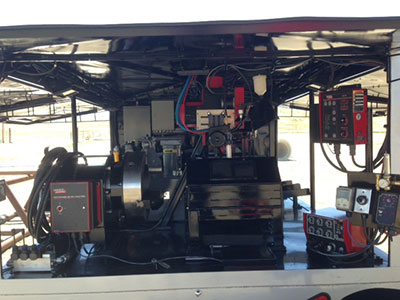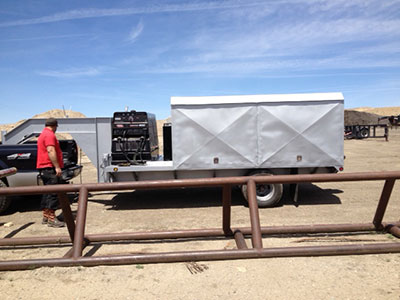TECH ENERGY BIG SKY IST DIE GRENZE FÜR COLORADO HARDBANDER
Tech Energy is capitalizing on the Western drilling boom via development of portable hardbanding machinery
Below the rugged terrain of the Intermountain West region rests an abundance of fossil fuels that humans now have the technology to harness. Drill rigs are the means to reach natural gas and oil deposits, and their use in Western states has exploded since the 2009 recession. Given their rough duty, especially rigs that undertake directional drilling, they demand protection, and that is where Tech Energy comes in. Specializing in hardbanding, the welding of alloy wire to down-hole attachments such as drill-pipe joints and collars for abrasion protection, the Grand Junction, Colo., company has been plying its trade since 2007.
“Colorado has close to 130 oil and gas drill rigs, and a pipe string for each rig can cost $1-$1.5 million,” says Dave Milo, Tech Energy president. “With more than $100 million of drill pipe in Colorado alone, not counting all of the directional tools and other components, such an investment must be protected. If we can place long-lasting hardbands, we can triple or quadruple the life of those drill strings.”
Tech Energy (techenergyhardbanding.com) provides hardbanding for rigs not only in Colorado but also in the Dakotas, Wyoming, Utah, New Mexico and other Western states – more than 80 percent of its business is outside of Colorado – so the company travels far and wide to protect drilling assets. Though traditionally more of a shop practice, hardbanding of pipe from 4 to 8 inches in diameter via portable setups at drill sites is Tech Energy’s stock-in-trade, and the reason why Milo helped form the company with three partners.
Today, five employees, including two two-person crews and a shop foreman, operate out of the company’s Colorado headquarters. That number is expanding, however, as Tech Energy readies a second operation in Casper, Wyo. Central to expansion is the company’s commitment to using welding technology to constantly improve its portable-hardbanding process.
Learned Lessons from Initial Portable Hardbander
Tech Energy’s initial portable hardbander, created when the company was established, left plenty to be desired as an over-the-road solution, according to Milo, who jokingly describes it as “the most complex and expensive machine in the history of welding.”
Milo, who had owned a trucking company, admits he knew only a bit about welding and nothing about hardbanding when he formed the business along with another investor and two longtime hardbanders, and the learning curve was steep.
“That first machine was way too elaborate to be portable,” he recalls.
The unit, in a 32-foot-long, enclosed gooseneck trailer, included a pipe-handling system and required almost a full acre of space for a hardbanding setup. To make things more difficult, the team lacked contacts in the oil and gas industry and had no orders. Despite all of these hurdles, as word got out the work came in.
“Within a month we went crazy with business,” says Milo.
Though not quite what Milo had in mind regarding portability, that original machine does function well as an onsite hardbander at Tech Energy.
Partnership, Better Grasp of Technology Spell Success
The foray into portability did not end with that first unit. Driven by increased business and the goal to build the business outside of Colorado, Milo and his partner bought out the two hardbanding veterans and took lessons learned from the first portable-hardbander project to set about creating a second machine, looking to evolve homegrown portable-hardbander technology. So began Tech Energy’s relationship with Lincoln Electric. This second machine, with a Lincoln Electric power source and mixed with components from various suppliers, was more compact and worked well for a couple of years, reports Milo, but then exhibited feeding issues leading to defects in the weld. His Lincoln Electric contact suggested installation of the company’s LN-10 wire feeder to replace a feeder from another manufacturer. The LN-10 features a robust dual-driven drive-roll design, presettable voltage and wire-feed speed, controls for safe wire loading and unloading, and selectable trigger control. The replacement did the trick, according to Milo, and the problem was solved. The success of this hardbander, which continues to operate in the field, spurred Tech Energy to reach farther.
Impressed with Lincoln Electric’s expertise and equipment as exhibited on that second unit, Milo traveled to FABTECH in 2012, looking to partner with Lincoln Electric and its engineers on a new machine offering increased dependability and ease of use – a state-of-the-art portable hardbander.
“We wanted a machine that is revolutionary for the industry,” he says “and we wanted to make it easy for its operators.”
This third machine came closer to Milo’s ideal vision, and led to a new business plan for Milo and Tech Energy. Taking the machine to North Dakota for work, Milo ended up selling it. Who bought it?
“One was an insurance agent and the other was a security guard,” Milo says.
The sale speaks to the surge in oil and gas drilling in the region, and the relative inexperience of the buyers hints at Tech Energy’s efforts in making the machines user friendly, even for novices.
“I sent my top manager to train these guys,” offers Milo, “and now they are doing well with it.”
New Goal: Supply Industry with Portable Hardbanders
Over time, Tech Energy’s business plan has evolved as has its machinery. Today, Milo believes that advances in the portable hardbanders his company develops will yield machine sales to other hardbanders – Milo’s ultimate goal for the company.
That is why Tech Energy has spent this past winter and spring developing and building a fourth portable GMAW hardbander via a close working relationship with Lincoln Electric on design and components.
The heart of this new machine is a Lincoln Electric Vantage® 500 engine-driven multi-process welder. The diesel engine provides 500 amps of welding power at 100-percent duty cycle output or 525 amps at 60-percent. It can produce as much as 12,000 watts of continuous 1-phase AC generator power for common construction tools while simultaneously welding at 250 amps. The machine also produces 20,000 watts of continuous 3-phase 240-volt AC generator power to run a plasma cutter (compressed air required), pump or inverter welder for a second arc.
The power-generation capability of this next-generation portable hardbander is key for Tech Energy, as it must run all of the add-on equipment carried by company crews, including grinders, lights and hydraulics. Milo also points to the welder’s ability to operate in extreme environments – with a block heater, he notes, crews will be able to start the unit and work in 10 F-degree weather.
“With this welder, we don’t have a problem with power failure as we weld or add amps,” says Milo.
The welder runs to an LN-10 wire feed that dispenses Lincoln Electric’s SuperArc® L-56® 1/16-inch-diameter wire. During Tech Energy’s GMAW hardbanding process, carbide is introduced into the weld puddle via a hopper system. The process also introduces tungsten granules. These ingredients and method of delivery help ensure the even application of particles that add wear resistance – of utmost importance in hardbanding.
Milo has yet to decide on a particular torch for this newest hardbander, but it will benefit from a motorized slide-control system and weld oscillator system, both from Arc Products, a Lincoln Electric company. The slide control allows the hardbander’s operators horizontal and vertical axis positioning for the welding arc, with manual control movement via an intuitive joystick pendant. The control is ideal for hardbanding, as it is recommended for repetitive welding applications to improve weld consistency and quality. The weld oscillator system provides side-to-side motion of the weld gun to produce an appropriate weld pass weave pattern in the joint. Together they provide the hardbander with automated movement that will assist Tech Energy’s field operators in quickly learning how to run the new machinery and produce consistent, quality welds.
The new portable hardbander will also employ a Lincoln CoolArc® 40 water cooler to cool the torch.
“We’ve tried to air-cool the torch but the summer months are much too hot,” says Milo.
Tech Energy and Lincoln Electric also are partnering to incorporate an operator console that brings all of welding control functions into a central location. This is expected to help ease system operation while increasing user safety by not requiring operators to reach over weld areas to make parameter adjustments.
Simple Transport, Use and Operation are Keys
Through the entire evolution of Tech Energy’s portable hardbanders, Milo has strived for simple transport, ease of use and dependability, and that third version, completed in early 2013 and now out in the field, has shown that his company is on the right track.
“Sometimes we’ll have to pull a hardbander to a rig location that’s 40 miles off of the beaten path on a logging road,” he says. “We’ve found that pulling a trailer unit into such a location is easier than hauling a skid-mounted unit. Also, if the rig slides or pipe is moved, we can relocate a trailer-mounted hardbander easily.”
In addition, the progression of portable hardbanders built by Tech Energy boasts weight reduction, an important consideration. The company’s first ”portable” hardbander measured 32 feet long and weighed 21,000 pounds without any extra equipment or product. The under-construction unit will weigh less than 10,000 pounds and can be towed with a single-axle full-sized pickup, not the one-ton dualees required for previous setups. Less weight and smaller towing vehicles also mean no need for drivers with commercial driver licenses and the increased regulations that follow.
“We wanted to design a compact and light machine that can hold all the components, wire and gases, and other equipment,” Milo says, noting that much of that goal will be achieved in the company’s newest portable hardbander. “With the Lincoln Electric product being compact and easy to place and maneuver around, we can build a trailer that not only gives us the room to take extra product with us but also is light and user friendly.”
The new design also offers durability.
Tech Energy’s behemoth heavily computerized first unit experienced problems going on location due to vibration and fine dust that would damage the hardware. Excessive automation brought other problems, too. Imagine the operators turning on the unit and sitting back to drink coffee, listen to music and watch birds fly by, offers Milo.
“All of a sudden we can have 14 bands where only three are required, or a horizontal band instead of a vertical,” he jokes, exaggerating but making an important point. “We purposely are building the new unit so that operators have to pay attention and manually step over the weld, for example. The result is much cleaner product and a more organized process.”
In practice, operators back a portable hardbander up to pipe racks. Tech Energy builds its units so that pipe enters through the side, supported by two hydraulic jacks. A third jack sits on the other side of the through-hole welding box. Through-hole chucks provide for pipe holding and rotating. The actual hardbanding process takes about a minute-and-a-half per band, says Milo. Tech Energy uses cooling cans and insulating wrap to provide proper cooling after hardbanding.
Improvements in portable hardbanding should keep Tech Energy humming, especially as the U.S. Energy Information Agency predicts that, within the next five years, North America’s capacity of 3,487 capable drilling rigs will increase by 11 percent as operators continue developing shale resources.
As a specialist in nonmagnetic hardbanding, vital to ensure accuracy in directional and horizontal drilling that encompasses a large share of shale work, Tech Energy is further leveraged for growth. Given all of this, it appears that Dave Milo, a former trucking company owner only seven years into the business, has struck oil.




